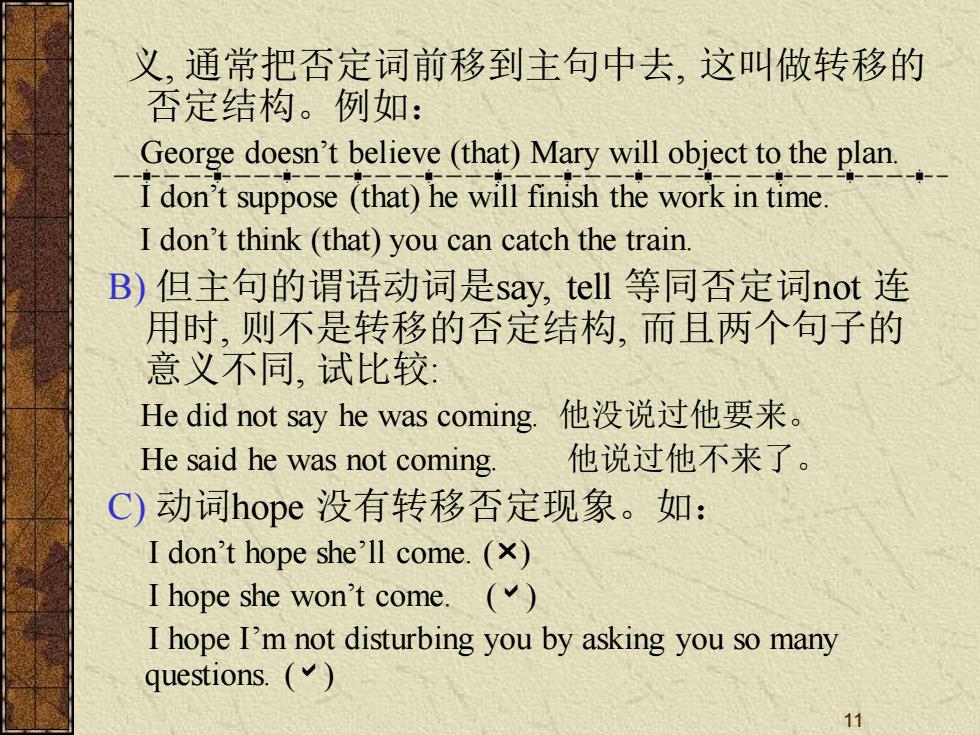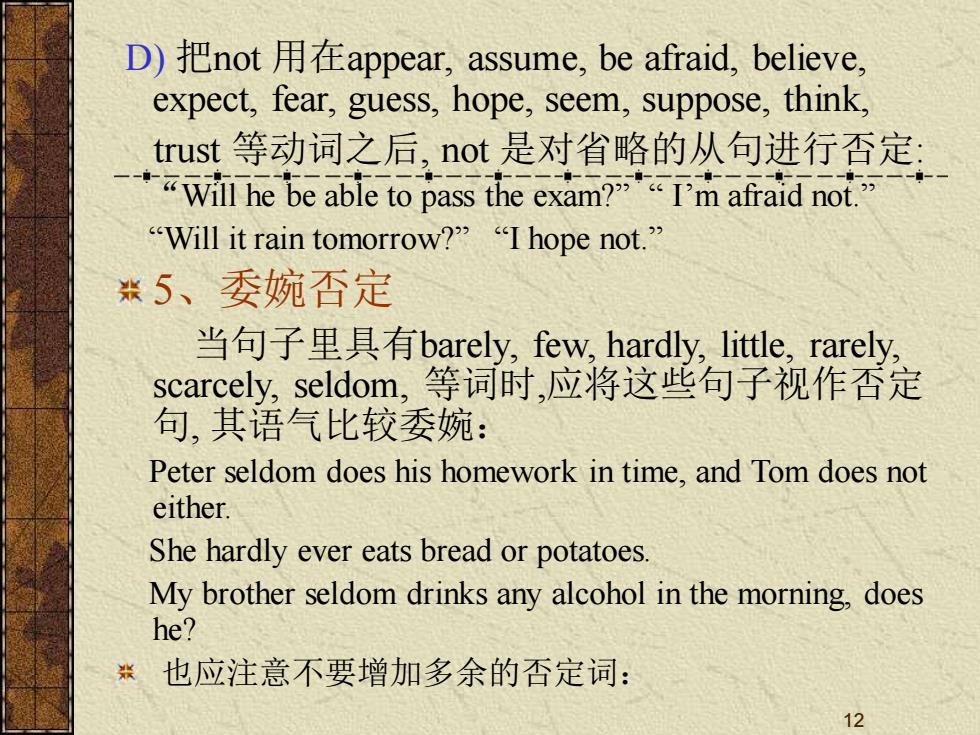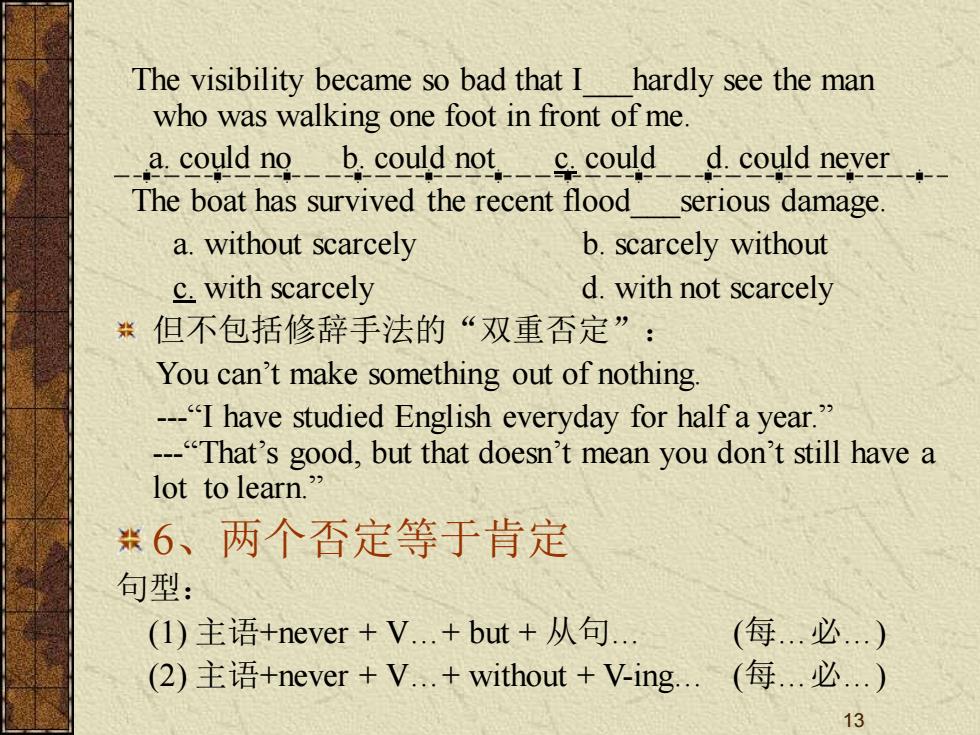
义,通常把否定词前移到主句中去,这叫做转移的 否定结构。例如: George doesn't believe(that)Mary will object to the plan. I don't suppose (that)he will finish the work in time. I don't think(that)you can catch the train. B)但主句的谓语动词是say,tell等同否定词not连 用时,则不是转移的否定结构,而且两个句子的 意义不同,试比较 He did not say he was coming..他没说过他要来。 He said he was not coming. 他说过他不来了。 C)动词hope没有转移否定现象。如: I don't hope she'll come.(x) I hope she won't come.( I hope I'm not disturbing you by asking you so many questions.( 11
11 义, 通常把否定词前移到主句中去, 这叫做转移的 否定结构。例如: George doesn’t believe (that) Mary will object to the plan. I don’t suppose (that) he will finish the work in time. I don’t think (that) you can catch the train. B) 但主句的谓语动词是say, tell 等同否定词not 连 用时, 则不是转移的否定结构, 而且两个句子的 意义不同, 试比较: He did not say he was coming. 他没说过他要来。 He said he was not coming. 他说过他不来了。 C) 动词hope 没有转移否定现象。如: I don’t hope she’ll come. () I hope she won’t come. () I hope I’m not disturbing you by asking you so many questions. ()

D)把not用在appear,assume,be afraid,believe,. expect,fear,guess,hope,seem,suppose,think, trust等动词之后,not是对省略的从句进行否定: "Will he be able to pass the exam?Im afraid not. “Will it rain tomorrow?”“I hope not. 5、委婉否定 当句子里具有barely,few,hardly,.little,rarely,. scarcely,.seldom,等词时,应将这些句子视作否定 句,其语气比较委婉: Peter seldom does his homework in time,and Tom does not either. She hardly ever eats bread or potatoes. My brother seldom drinks any alcohol in the morning,does he? 张也应注意不要增加多余的否定词: 12
12 D) 把not 用在appear, assume, be afraid, believe, expect, fear, guess, hope, seem, suppose, think, trust 等动词之后, not 是对省略的从句进行否定: “Will he be able to pass the exam?” “ I’m afraid not.” “Will it rain tomorrow?” “I hope not.” 5、委婉否定 当句子里具有barely, few, hardly, little, rarely, scarcely, seldom, 等词时,应将这些句子视作否定 句, 其语气比较委婉: Peter seldom does his homework in time, and Tom does not either. She hardly ever eats bread or potatoes. My brother seldom drinks any alcohol in the morning, does he? 也应注意不要增加多余的否定词:

The visibility became so bad that I hardly see the man who was walking one foot in front of me. a.could no b.could not c could d.could never The boat has survived the recent flood serious damage a.without scarcely b.scarcely without c.with scarcely d.with not scarcely 但不包括修辞手法的“双重否定”: You can't make something out of nothing. -"I have studied English everyday for half a year." --That's good,but that doesn't mean you don't still have a lot to learn.” 张6、两个否定等于肯定 句型: (I)主语+never+V..+but+从句. (每.…必.) (2)主语+never+V.+without+V-ing..(每.必..) 13
13 The visibility became so bad that I___hardly see the man who was walking one foot in front of me. a. could no b. could not c. could d. could never The boat has survived the recent flood___serious damage. a. without scarcely b. scarcely without c. with scarcely d. with not scarcely 但不包括修辞手法的“双重否定”: You can’t make something out of nothing. ---“I have studied English everyday for half a year.” ---“That’s good, but that doesn’t mean you don’t still have a lot to learn.” 6、两个否定等于肯定 句型: (1) 主语+never + V…+ but + 从句… (每…必…) (2) 主语+never + V…+ without + V-ing… (每…必…)

(3)There is no+名词+but+V..(没有一个..不.) (4)..few+复数名词+but+V..(几乎每个.都.) 例句: He never goes to a bookstore but he buys some books --0- =He never goes to a bookstore without buying some books. 他每次进书店一定买些书。 There is no mother but loves her children. 没有一个母亲不爱她的子女。 I know few people but are concerned about the air pollution. 几乎我所认识的每个人都关心空气污染。 张7、无否定词的否定 有些词汇虽无否定形式,却含否定意味。 A)连接词有before,lest,than,unless等: He became very angry before I could explain why I was late for the meeting 14
14 (3) There is no +名词 + but + V…(没有一个…不…) (4) …few + 复数名词 + but + V… (几乎每个…都…) 例句: He never goes to a bookstore but he buys some books. = He never goes to a bookstore without buying some books. 他每次进书店一定买些书。 There is no mother but loves her children. 没有一个母亲不爱她的子女。 I know few people but are concerned about the air pollution. 几乎我所认识的每个人都关心空气污染。 7、无否定词的否定 有些词汇虽无否定形式,却含否定意味。 A) 连接词有before, lest, than, unless 等: He became very angry before I could explain why I was late for the meeting

B)含有否定意义的动词有:deny,doubt,fail, hesitate,.lack,refuse,wonder,等。在表示否定时, 不能再与don't连用,否刚句子意思发生交化:, I doubt if he will come..我怀疑他是否能来。 Idon't doubt that he will come.我确信他能来。 He failed to follow my advice.他没有遵从我的劝告。 I never fail to keep my word. =I keep my word without fail.我一定守信。 装还有些对表示“劝阻、抑制”等的动词与fom搭配使 用时,介词后含否定意义,无需再加not,如:deter(劝 阻),dispense(免除),dissuade((劝阻),excuse(使免 除),keep,prevent,protect,restrain,save,stop等: 米 People began to prevent factories and cars from sending poisonous gases into the air. C)带有否定意义的介词有:above(超过.之外), 15
15 B) 含有否定意义的动词有: deny, doubt, fail, hesitate, lack, refuse, wonder, 等。在表示否定时, 不能再与don’t 连用,否则句子意思发生变化: I doubt if he will come. 我怀疑他是否能来。 I don’t doubt that he will come. 我确信他能来。 He failed to follow my advice. 他没有遵从我的劝告。 I never fail to keep my word. = I keep my word without fail. 我一定守信。 还有些对表示“劝阻、抑制 ”等的动词与from 搭配使 用时,介词后含否定意义,无需再加not,如:deter(劝 阻),dispense(免除),dissuade(劝阻),excuse(使免 除),keep,prevent,protect,restrain,save,stop等: People began to prevent factories and cars from sending poisonous gases into the air. C) 带有否定意义的介词有: above (超过…之外)